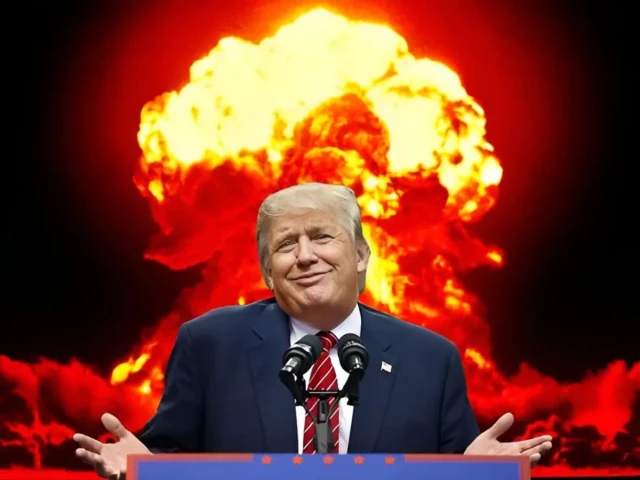Amidst rallying calls for a new "golden age" of "common sense" at President Donald Trump’s inauguration on 20th January, 2025 – bolstered by a heinous gesture resembling a Nazi salute from his favourite incel, Elon Musk – the new president of the United States is sworn into office with renewed promises to fight “wokeness” in educational institutes across the country.
For months, college leaders, advocates, and donors have been increasingly concerned about the potential impact of a second Donald Trump term on their institutions, which positions the Republican party to intensify a strategic campaign detrimental to higher education.
Alongside Vice President J. D. Vance who has labelled universities as "the enemy”, Trump champions the belief that colleges should be rescued from "Marxist maniacs”.
“We are going to restore patriotism to our schools, get radical, left, woke ideologies the hell out of our military and out of our government,” declares Trump at a rally in the Capital One Arena a day before his inauguration.
Prior to his reelection, college leaders were already wary of Trump’s promises to overhaul the accreditation system to enforce calculated ideological shifts, promoting what he terms a more "pro-American" stance.
“The time has come to reclaim our once great educational institutions from the radical Left, and we will do that,” says Trump “Our secret weapon will be the college accreditation system.”
By potentially allowing states to accredit institutions directly or approving new accrediting agencies more favorable to for-profit colleges, he aims to reshape the educational landscape in the United States. The goal is to implement a system of taxes and penalties targeting schools he considers “too woke”, and in line with this, he has proposed withdrawing federal funding from institutions that promote critical race theory and other content he deems inappropriate.
Trump's agenda also includes targeting Diversity, Equity, and Inclusion (DEI) programs, which he and his allies view as vehicles for this alleged "woke" indoctrination. The potential for increased federal intervention in curriculum decisions and the elimination of DEI programs is seen as a direct challenge to the foundational principles of equitable higher education.
These proposed policies have generated concern among academic leaders, who fear that such measures could undermine institutional autonomy and academic freedom.
This is not Trump's first attempt to tax university endowments. In 2017, he signed a bill imposing a 1.4% tax on the income of wealthy private university endowments. Additionally, Vice President J.D. Vance proposed legislation in 2023 to increase this tax rate to 35% for private universities with assets exceeding $10 billion.
In a 2023 video featured in Agenda47, Trump’s re-election platform, he revealed his intention to use the billions of dollars generated from taxing, fining, and suing large private university endowments to establish the "American Academy."
The "American Academy," a new institution intended to be "strictly non-political" and devoid of "wokeness or jihadism” aims to compile educational content across various disciplines and offer it online for free to all American citizens. To finance this academy, Trump proposes taxing, fining, and suing private university endowments, particularly targeting institutions with substantial financial reserves.
The Department of Education, handling about $229 billion of the 2024 federal budget, has become a central political target, with calls for its elimination stretching back decades -- its potential dismantling has become increasingly possible with congress under Republican control.
While Republican opposition to the Department has existed since its establishment in 1979, the debate over its future gained new momentum after the COVID-19 pandemic, during which Americans, particularly Republicans, became increasingly dissatisfied with public schools and the role the federal government plays in regulating them. This dissatisfaction is part of a broader cultural and political shift, where the Department has become a symbol of tensions over issues such as race, gender, and the perceived leftward political direction of education.
The department plays a crucial role in overseeing essential programs like Pell Grants, special education funding, and civil rights enforcement, helping to ensure equal access to education for disadvantaged students.
Universities lack a clear consensus on how to prepare for a new Trump administration, largely because it is uncertain how much of the president-elect’s rhetoric will translate into concrete actions.
Colleges and universities, often seen as liberal strongholds that provide refuge from Trumpism and embrace policies from Democratic administrations, have been a longstanding target of the MAGA movement
“If you’re a college president, you’re holding onto your desk very tightly. A second Trump term could mean a disaster for those who care about student success. A second Trump term opens the door to a lot of bad actors, bad policies, and subpar institutions.” says Michael Itzkowitz, a deputy chief of staff for higher educations’ office in the Obama-era Department of Education.
Trump appears eager to stir these conflicts, knowing that colleges serve as an ideal battleground for his broader culture war. They are an easy and visible target for his supporters to attack as centers that champion progressive policies on race and gender.
Ultimately, Trump’s inauguration signals a new era that focuses on defending the rights of white Americans who feel excluded by initiatives designed to support historically marginalized groups.



COMMENTS
Comments are moderated and generally will be posted if they are on-topic and not abusive.
For more information, please see our Comments FAQ